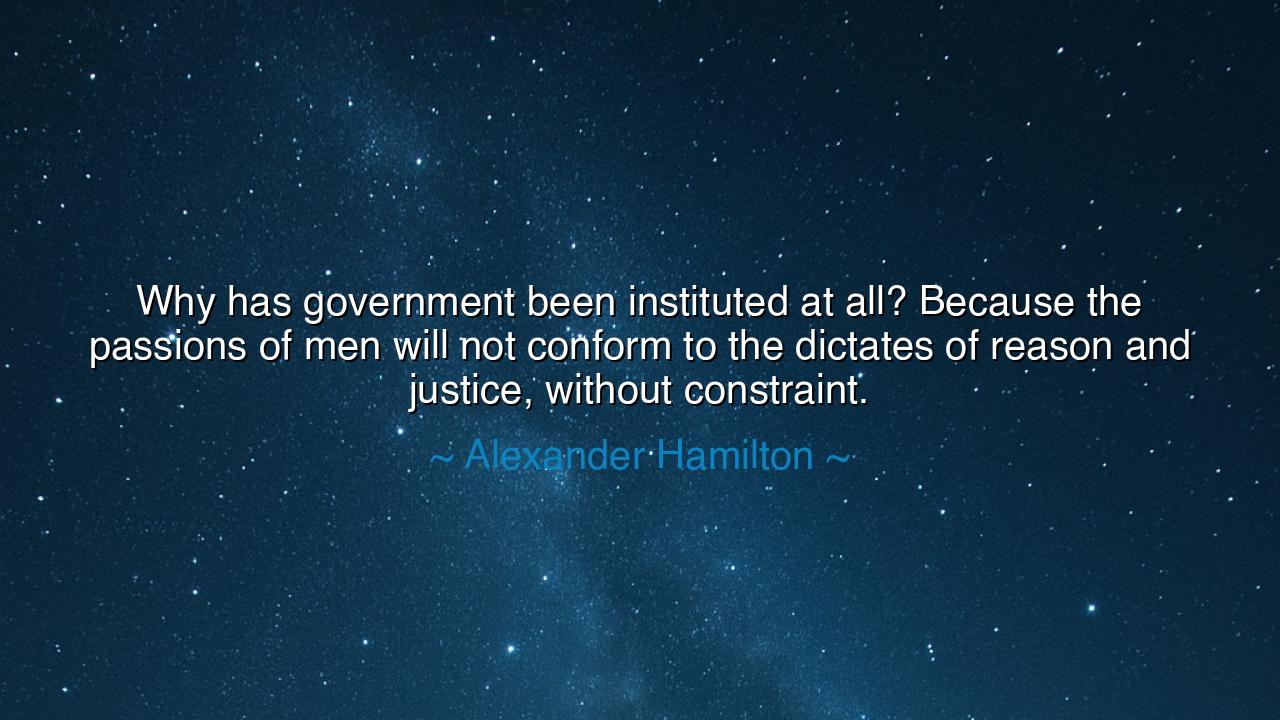
Why has government been instituted at all? Because the passions
Why has government been instituted at all? Because the passions of men will not conform to the dictates of reason and justice, without constraint.






"Why has government been instituted at all? Because the passions of men will not conform to the dictates of reason and justice, without constraint." – Alexander Hamilton
In this grave and timeless reflection, Alexander Hamilton, one of the principal architects of the American Republic, speaks to the frailty and duality of human nature. He reminds us that government exists not merely to organize society, but to restrain the darker impulses that dwell within every human heart. The question he poses—“Why has government been instituted at all?”—is both rhetorical and philosophical. His answer, clear and unsparing, cuts to the marrow of political truth: because reason and justice alone cannot rule men whose passions burn hotter than their conscience. It is a truth as old as civilization itself—that freedom without order leads not to harmony, but to chaos.
The origin of this quote can be traced to Hamilton’s writings in The Federalist Papers, where he and his fellow Founders sought to explain and defend the Constitution of the United States. Having witnessed the failures of the Articles of Confederation, Hamilton understood the dangers of unrestrained liberty—the lawless anarchy that erupts when men, guided only by their desires, reject the discipline of law. To him, government was not an enemy of freedom, but its guardian. It was a necessary constraint, designed to channel human passion toward productive ends and to ensure that justice, not force, would rule the land.
The meaning of his words reveals a profound understanding of human nature. “The passions of men”—ambition, greed, anger, pride—are both the source of greatness and the seed of destruction. Left unbridled, they lead to tyranny, envy, and violence. Hamilton did not idealize mankind; he respected its potential but feared its impulses. He saw that without a structure to temper those passions, society would devour itself. Thus, he believed in a strong central government—not to enslave the people, but to protect them from the worst tendencies of their own kind. For as fire must be contained to provide warmth, so must power be restrained to preserve freedom.
Consider the fall of the French Revolution, whose early cry for liberty descended swiftly into terror. The people, weary of kings, overthrew their rulers in the name of equality, but without a firm structure of government to restrain passion, justice turned to vengeance, and reason to madness. The guillotine became the law, and virtue was drowned in blood. Hamilton’s warning, though written from afar, was prophetic: where passion rules without constraint, anarchy gives birth to tyranny. History has confirmed his wisdom again and again—from the mob rule of ancient Athens to the dictatorships of modern times.
Yet Hamilton’s statement carries not despair, but clarity. He does not condemn the passions of men; he seeks to govern them with reason. For in passion also lies courage, creativity, and strength. Government, in his view, must not crush these forces, but balance them—binding the destructive impulses and liberating the constructive ones. It is this delicate equilibrium, maintained through law and virtue, that sustains civilization. When law is absent, the strong oppress the weak; when law is excessive, the spirit of man withers. Therefore, the highest art of governance lies in tempering passion without extinguishing it.
Hamilton himself embodied this struggle between passion and restraint. Fiery and brilliant, he was both the architect of order and the victim of his own pride. His duel with Aaron Burr, born of wounded honor and ungoverned emotion, stands as a tragic reminder of the very truth he preached: that even the greatest among us are not immune to the tyranny of passion. The man who sought to build laws to restrain others could not always restrain himself—a lesson that lends his words both power and poignancy.
The lesson of Hamilton’s insight endures for all time: that freedom without self-discipline is destruction, and justice without structure is illusion. We must not despise government for its limits, but ensure that it serves moral truth rather than power. Each person, too, must become the governor of their own soul, restraining impulse with conscience, anger with reason, and greed with gratitude. If men cannot rule themselves, no form of government will save them; but if they master their passions, even the simplest system can sustain peace.
So let Hamilton’s wisdom be a lamp to those who govern and those who are governed: that reason must guide passion, that justice must triumph over ambition, and that the true foundation of liberty is not the absence of constraint, but the presence of self-control. For it is only when man conquers the chaos within that he may live freely—and build, with his brothers, a world governed not by fear, but by wisdom.






AAdministratorAdministrator
Welcome, honored guests. Please leave a comment, we will respond soon